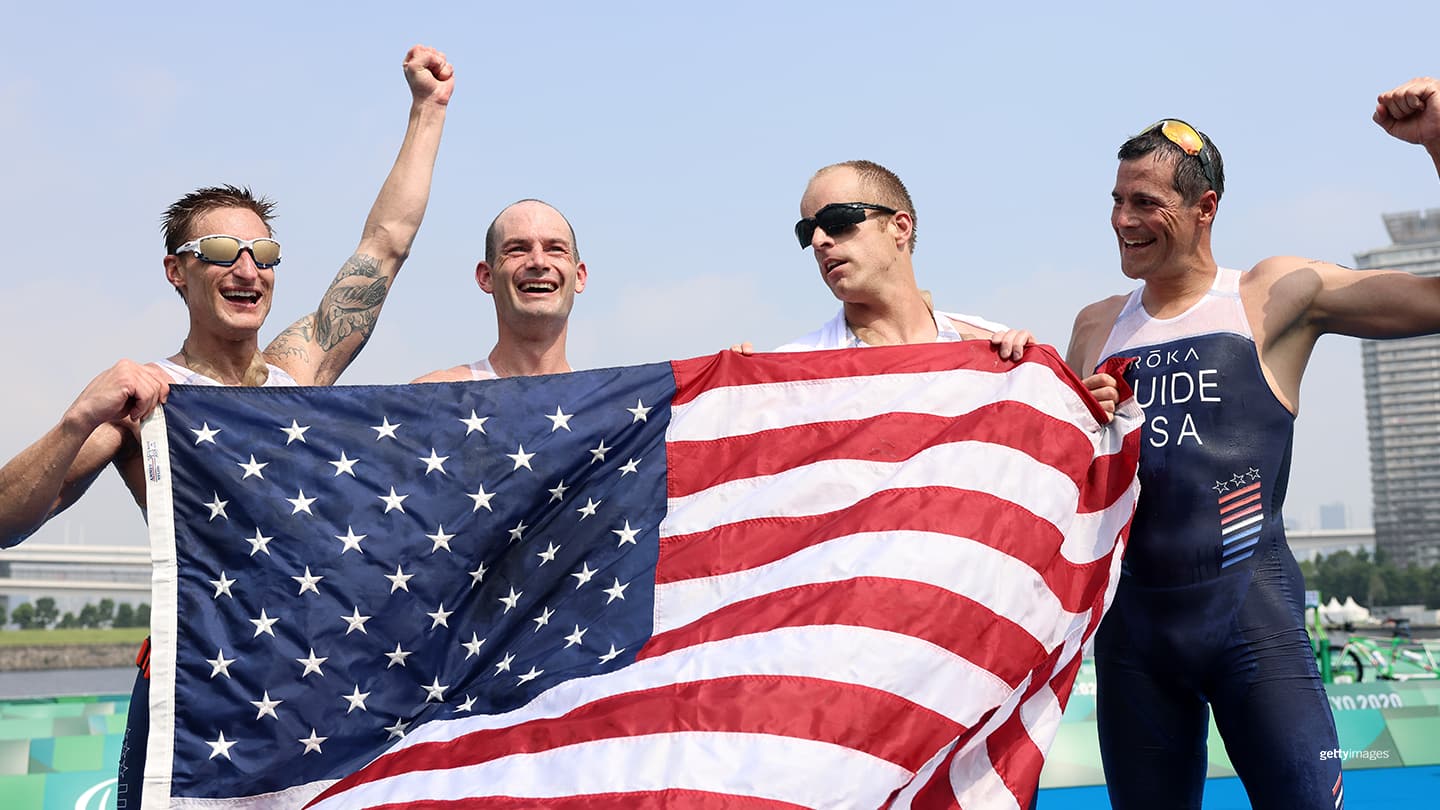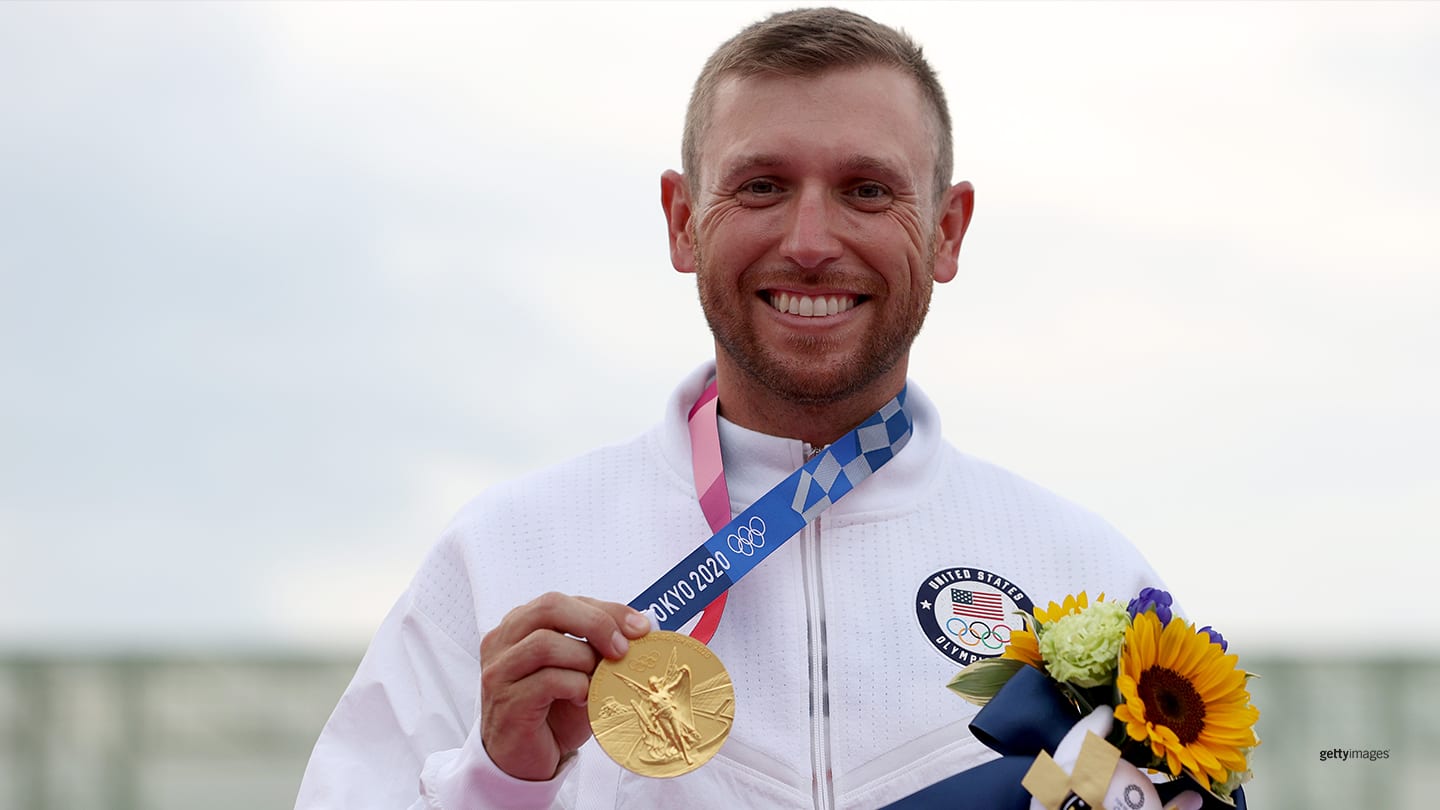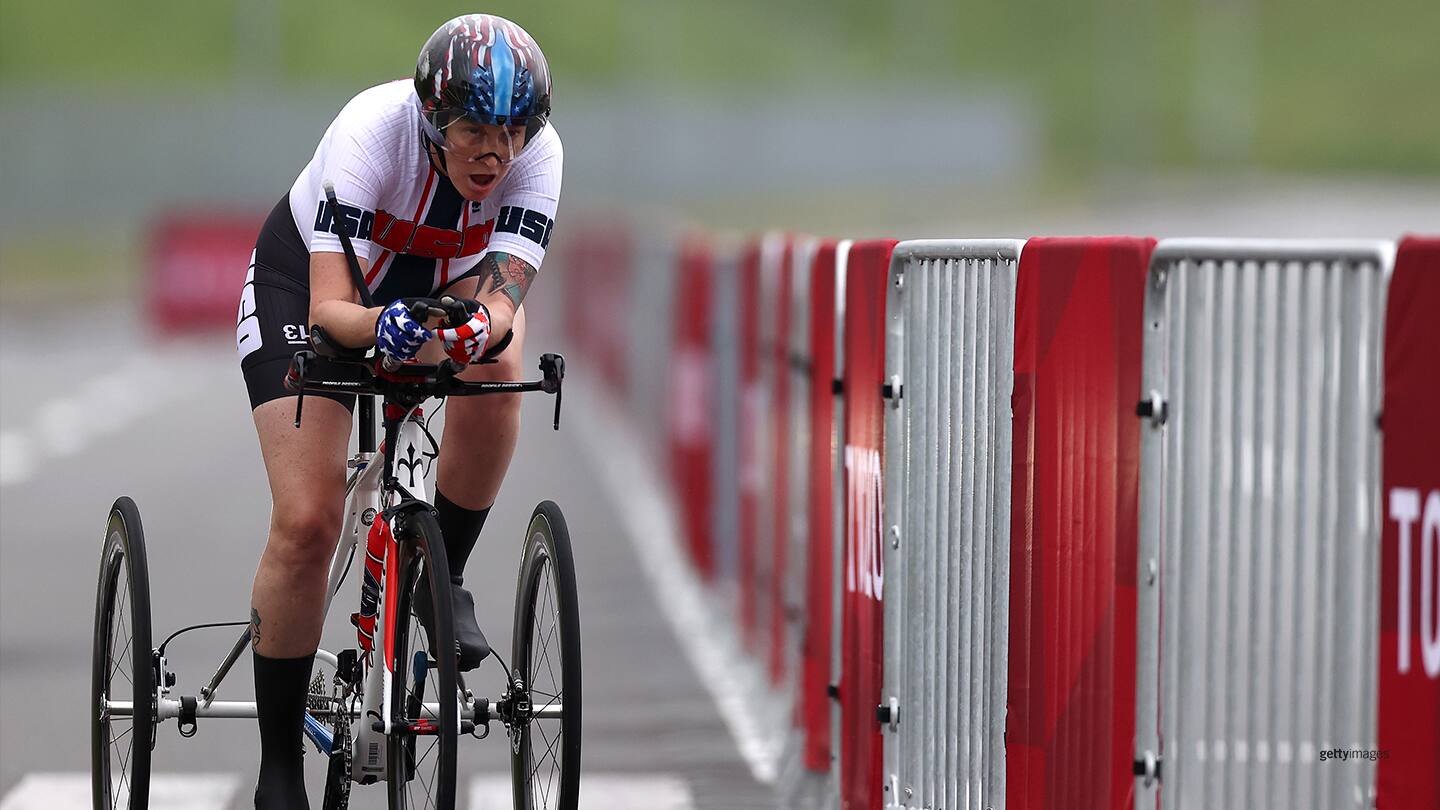
A Salute To The Veterans Who Bring Their Unique Talents To The U.S. Olympic & Paralympic Teams
by Bob Reinert

Gold medalist Brad Snyder, his guide Greg Billington, Kyle Coon and his guide Andy Potts celebrate after finishing the men's PTVI triathlon at the Paralympic Games Tokyo 2020 on Aug. 28, 2021 in Tokyo.
When terrorists flew airliners into the World Trade Center and the Pentagon and another plane was downed in a Shanksville, Pennsylvania, field on Sept. 11, 2001, Brad Snyder was a student at Northeast High School in St. Petersburg, Florida.
Snyder immediately realized that his future would include military service. He attended the U.S. Naval Academy and later served in Afghanistan, where in 2011 he lost his eyesight to an improvised explosive device blast.
The former Naval Academy swim captain found his way into the U.S. Paralympic program and has now earned six gold medals and a pair of silver medals in two sports across three Games. At the recent Paralympic Games Tokyo 2020, he became the first American man – disabled or able-bodied – to earn a gold medal in an Olympic or Paralympic triathlon when he won the PTVI event.
“The military does a lot to make you deal with challenges,” Snyder had told TeamUSA.org the year after he was wounded. “You move around all the time and have to make new friends. You have to carry out difficult tasks and learn how to communicate. It is a very intense skill set.
“So, with my blindness it was just a new challenge for me. It’s just a new problem set. This is just the next thing to overcome.”
Snyder always seems to seek new challenges. He and wife Sara just announced that they’re expecting a baby girl in March. Meanwhile, Snyder is pursuing a PhD in the Princeton University School of Public and International Affairs with the intention of returning to teach at the Naval Academy.
According to the U.S. Department of Veterans Affairs, Snyder was one of 21 military veterans, including three active-duty service members, to represent the U.S. at the recent Paralympic Games in Tokyo. They included 14 Army veterans, four Navy veterans, two Marine Corps veterans and one Air Force veteran.
As another Veterans Day is observed today, it’s appropriate to recognize the contributions made by Snyder and other military veterans to the Olympic and Paralympic movements after they had answered their nation’s call and served so honorably.

Vincent Hancock poses following the men's skeet finals at the Olympic Games Tokyo 2020 on July 26, 2021 in Asaka, Saitama, Japan.
Vincent Hancock, who has won three gold medals in skeet shooting in four Olympic Games, including Tokyo, served in the U.S. Army Marksmanship Unit from 2006 to 2012. He traces his Olympic success back to those days.
“I know … without the Army that I wouldn’t be the person that I am today,” Hancock, of Eatonton, Georgia, said. “That’s just plain and simple.”
Hancock did his basic training between his junior and senior years in high school and came back a changed person.
“I was a vastly different person both in and out of the classroom,” Hancock said. “I had a whole new perspective on what life was about. At that point in time, I felt like I was way more mature than my peers because I had been through that summer of hardship, of pushing myself beyond the limits.”
Hancock won his first two Olympic gold medals and a world championship while still in the Army, and he’s the first skeet shooter to win back-to-back Olympic golds. He has won a total of four world championships gold medals.
While in the marksmanship unit, Hancock had the chance to meet and compare notes with Army Rangers, Special Forces operators, Delta Force members and Navy SEALs.
“Those guys are true athletes,” Hancock said. “I’m going through my own kind of pressure, but it’s a competitive one. It’s not … life or death. Those guys truly know and understand, on such a serious level, how to perceive things, how to handle things.”

Monica Sereda competes during the women's T1-2 time trial at the Paralympic Games Tokyo 2020 on Aug. 31, 2021 in Tokyo.
Monica Sereda, who retired as a master sergeant from the Army in 2011 after 24 years, made her Paralympic Games debut in Tokyo at age 54 in Para-cycling. She placed fourth in the road race and seventh in the time trial.
Sereda had served during the Panama invasion, the First Gulf War and Operation Iraqi Freedom.
“I was in (psychological operations) for the first six years,” the St. Petersburg, Florida, native recalled. “So, that kind of shaped me and made me grow up, real quick.
“When that first bullet comes whizzing by you … it’s pretty real. Having all of that just kind of made me realize that it’s time to step up and out and be the person you need to be. I think that kind of shaped me. I think that was key.”
Veterans Day is always especially meaningful for Sereda.
“I had a friend that passed away in Saudi (Arabia) during Gulf (War) I around this time (of year),” Sereda said. “I think of him and how he was a very good mentor to me.”
Hancock expressed his love for the country and those who protect it every day.
“To me, it doesn’t matter who you are, where you come from, or what you believe in,” Hancock said. “If you’re putting your name on that name tag on that (military uniform), then you are my brother and sister, and I appreciate you. I appreciate everything they do, and I always will.”
No matter where he is or how busy he might be, Hancock tries to take a moment to remember those in uniform on Veterans Day.
“I try to always just kind of stop and reflect a little bit,” Hancock said. “I’m so thankful. For me, it means more than most people will ever know.”
Bob Reinert spent 17 years writing sports for The Boston Globe. He also served as a sports information director at Saint Anselm College and Phillips Exeter Academy. He is a contributor to USParaSwimming.org on behalf of Red Line Editorial, Inc.